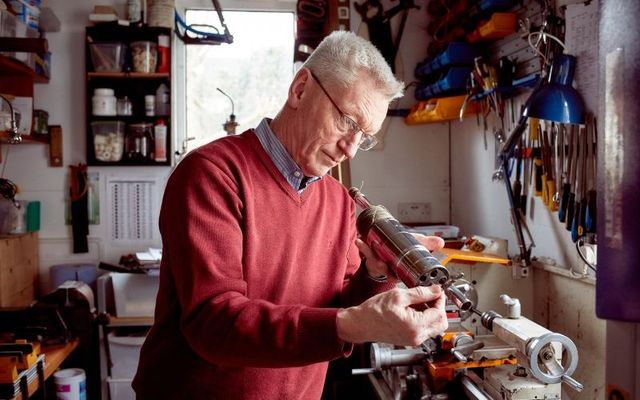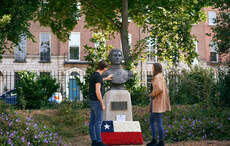A two-year uilleann pipe-making class in Dublin is helping to preserve one of Ireland's oldest traditional instruments.
The uilleann pipe-making class is part of Ballyfermot College of Further Education's instrument-making course (which also features flute and whistle-making courses) and takes place in the PipeCraft Training Centre in Clonsaugh on the north side of Dublin city.
Running since 2018, the course has helped to spread vital knowledge about a tradition that was once in danger of dying out.
Mick O'Brien, who recently won musician of the year at the TG4 Gradam Ceoil awards, teaches the second year of the course and told IrishCentral that pipe-making was at a very low ebb in the 1970s following the death of Leo Rowsome - Ireland's last professional pipe maker - in 1970.
"At the time, it was reckoned that there were only 100 pipers in the country. That's a very small number of people playing pipes," O'Brien told IrishCentral. "It was difficult to get pipes. It was difficult to get people who could make reeds for your pipes. If those skills weren't developed, well then pipes were gone."
However, the launch of Na Píobairí Uilleann (society of Irish pipers) in 1968 has greatly helped to promote and protect uilleann pipe-making in Ireland over the past 50 years.
Throughout the 1970s, members of Na Píobairí Uilleann began teaching musicians how to make reeds - a material that vibrates to produce an instrument's sound - and the craft of uilleann pipe-making gradually rebounded over the following decades.
Nowadays, there are uilleann pipe makers as far away as Japan and the United States, O'Brien said.
Despite ensuring the survival of the pipe-making tradition, Na Píobairí Uilleann still didn't offer a formal class and decided to launch one about 15 years ago before eventually joining with Ballyfermot College of Further Education.
The first-ever course taught roughly ten students how to make uilleann pipes, O'Brien said.
A testament to the success of the course, Joe Walsh - one of its first-ever participants - now teaches first years in the same course.
The course also teaches participants how to play the uilleann pipes, something that O'Brien says is crucial for all uilleann pipe makers.
"You need to be able to play the pipes to make them. You can't tune it properly otherwise. You don't know how the instrument is playing if you don't know how to play it."
O'Brien added that Na Píobairí Uilleann also plans to acquire a building adjacent to its headquarters on Henrietta Street as part of plans to develop an international uilleann pipe center. The new building will consist of a 120-seater theater for traditional music shows in addition to a museum dedicated to the history of the uilleann pipe.
O'Brien said Na Píobairí Uilleann also organizes classes every Tuesday for musicians of all abilities, hosting ten different classes for uilleann pipe players.
The organization has also linked up with Music Generation - a national music education program - to bring uilleann pipe lessons around the country.
"Anywhere that there are music generation classes like Louth, Wexford, Laois, Offaly, Mayo, or Galway, Píobairí Uilleann have sent pipers teachers down," O'Brien said.
He added that the organization also regularly travels to traditional music festivals around the country, inviting festival-goers to try their hand at playing the uilleann pipes.
"People tend to think that pipes are very difficult to play, but every instrument is difficult to play. If people get a chance, they might think that it's not as difficult as it looks."




Comments